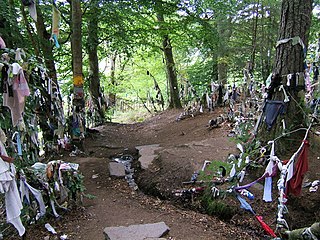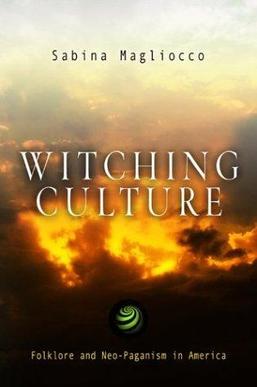Related Research Articles

A pilgrimage is a journey to a holy place, which can lead to a personal transformation, after which the pilgrim returns to their daily life. A pilgrim is a traveler who is on a journey to a holy place. Typically, this is a physical journey to some place of special significance to the adherent of a particular religious belief system.
The meaning of spirituality has developed and expanded over time, and various meanings can be found alongside each other. Traditionally, spirituality referred to a religious process of re-formation which "aims to recover the original shape of man", oriented at "the image of God" as exemplified by the founders and sacred texts of the religions of the world. The term was used within early Christianity to refer to a life oriented toward the Holy Spirit and broadened during the Late Middle Ages to include mental aspects of life.

A fetish is an object believed to have supernatural powers, or in particular, a human-made object that has power over others. Essentially, fetishism is the attribution of inherent non-material value, or powers, to an object. Talismans and amulets are related. Fetishes are often used in spiritual or religious context.
Glastonbury Tor is a tor near Glastonbury in the English county of Somerset, topped by the roofless St Michael's Tower, a Grade I listed building. The site is managed by the National Trust and has been designated a scheduled monument. The Tor is mentioned in Celtic mythology, particularly in myths linked to King Arthur, and has several other enduring mythological and spiritual associations.
Psychology of religion consists of the application of psychological methods and interpretive frameworks to the diverse contents of religious traditions as well as to both religious and irreligious individuals. The various methods and frameworks can be summarized according to the classic distinction between the natural-scientific and human-scientific approaches. The first cluster amounts to objective, quantitative, and preferably experimental procedures for testing hypotheses about causal connections among the objects of one's study. In contrast, the human-scientific approach accesses the human world of experience using qualitative, phenomenological, and interpretive methods. This approach aims to discern meaningful, rather than causal, connections among the phenomena one seeks to understand.
Beliefnet is a Christian lifestyle website featuring editorial content related to the topics of inspiration, spirituality, health, wellness, love and family, news, and entertainment.

Celtic neopaganism refers to any type of modern paganism or contemporary pagan movements based on the ancient Celtic religion. One approach is Celtic Reconstructionism (CR), which emphasizes historical accuracy in reviving Celtic traditions. CR practitioners rely on historical sources and archaeology for their rituals and beliefs, including offerings to spirits and deities. Language study and preservation are essential, and daily life often incorporates ritual elements. While distinct from eclectic pagan and neopagan witchcraft traditions, there is some overlap with Neo-druidism.
Secular spirituality is the adherence to a spiritual philosophy without adherence to a religion. Secular spirituality emphasizes the inner peace of the individual, rather than a relationship with the divine. Secular spirituality is made up of the search for meaning outside of a religious institution; it considers one's relationship with the self, others, nature, and whatever else one considers to be the ultimate. Often, the goal of secular spirituality is living happily and/or helping others.

A clootie well is a holy well, almost always with a tree growing beside it, where small strips of cloth or ribbons are left as part of a healing ritual, usually by tying them to branches of the tree. Clootie wells are places of pilgrimage usually found in Celtic areas. It is believed the tradition comes from the ancient custom of leaving votive offerings in water. In Scots, a clootie or cloot is a strip of cloth or rag.

Religion and geography is the study of the impact of geography, i.e. place and space, on religious belief.

Religious tourism, spiritual tourism, sacred tourism, or faith tourism, is a type of tourism with two main subtypes: pilgrimage, meaning travel for religious or spiritual purposes, and the viewing of religious monuments and artefacts, a branch of sightseeing.

In religious studies and folkloristics, folk religion, traditional religion, or vernacular religion comprises various forms and expressions of religion that are distinct from the official doctrines and practices of organized religion. The precise definition of folk religion varies among scholars. Sometimes also termed popular belief, it consists of ethnic or regional religious customs under the umbrella of a religion; but outside official doctrine and practices.
Scholarly studies have investigated the effects of religion on health. The World Health Organization (WHO) discerns four dimensions of health, namely physical, social, mental, and spiritual health. Having a religious belief may have both positive and negative impacts on health and morbidity.

Witching Culture: Folklore and Neo-Paganism in America is a folkloric and anthropological study of the Wiccan and wider Pagan community in the United States. It was written by the American anthropologist and folklorist Sabina Magliocco of California State University, Northridge and first published in 2004 by the University of Pennsylvania Press. It was released as a part of a series of academic books titled 'Contemporary Ethnography', edited by the anthropologists Kirin Narayan of the University of Wisconsin and Paul Stoller of West Chester University.
Diane Ellen Goldstein is an American scholar of folklore, professor at Indiana University, and past president of the American Folklore Society.
Jennifer Westwood was a British author, broadcaster and folklorist. She was a Doctor of Philosophy with special interests in English Language, Anglo-Saxon and Old Norse. Her first book, Mediaeval Tales, was published in 1968. An active committee member of The Folklore Society from 1987 until 2003, she undertook a variety of duties including editing its publications and helping other authors. As a broadcaster, she worked on programmes produced for BBC Radio 4 and the corporation's Radio Norfolk. Commonly known as "Jen", after her second marriage she also authored books in the name of Jennifer Chandler.
The World Religions and Spirituality Project publishes academic profiles of new and established religious movements, archive material related to some groups, and articles that provide context for the profiles. It is referenced by scholars, journalists, and human rights groups to provide a scholarly representation of threatened communities.

Peter Jan Margry is a Dutch historian and European ethnologist who was till november 2022 professor European Ethnology at the University of Amsterdam and, from 1993 to 2022, senior fellow at the Royal Netherlands Academy of Arts and Sciences research center Meertens Institute in the Netherlands. Previously, he worked in The Hague and Den Bosch where he held positions as archivist-researcher, historian and archival inspector successively at the Dutch National Archives, the Court of Audit (Netherlands) and the Province of North Brabant. During the 1990s he was also active as a consultant on document heritage, working in Suriname and Papua (Indonesia).
Edward Fletcher Cass was a British miner, banker and authority on Lancashire folklore, industrial archaeology and the arts who was President of the Manchester Literary and Philosophical Society, Folklore Society, Lancashire and Cheshire Antiquarian Society and Society for Folk Life Studies.
Patricia Lysaght is an Irish folklorist. She is Professor Emerita of European Ethnology, University College Dublin, Ireland.
References
- 1 2 3 4 "Professor Marion Bowman, The Open University". www.open.ac.uk. Retrieved 2024-10-26.
- ↑ "Scotlands Sacred Islands With Ben Fogle "aims to focus on the power of the islands themselves to nurture and nourish religion and spirituality"". www.bbc.co.uk. Retrieved 2024-11-18.
- 1 2 "It's a way with the fairies". The Independent. 2013-09-23. Retrieved 2021-05-01.
- ↑ "Marion Bowman". The Conversation. 19 June 2014. Retrieved 2021-04-01.
- ↑ Bowman, Marion (27 July 2016). "The contented collector: materiality, relationality and the power of things". Material Religion. 12 (3): 384–386. doi:10.1080/17432200.2016.1192159. S2CID 193315973.[ non-primary source needed ]
- ↑ Bowman, Marion Irene (1998). Vernacular Religion and Contemporary Spirituality: Studies in Religious Experience and Expression (Thesis).
- ↑ "Bowman". The Baron Thyssen Centre for the Study of Ancient Material Religion. Retrieved 2021-04-01.
- ↑ "Steering Committee". The Baron Thyssen Centre for the Study of Ancient Material Religion. Retrieved 2021-04-01.
- ↑ "Cathedrals & Pilgrimage". Cathedrals & Pilgrimage. Retrieved 2021-04-01.
- ↑ "REF Case study search". impact.ref.ac.uk. Retrieved 2021-05-01.
- ↑ jeg?, Besøksadresse P. A. Munchs husNiels Henrik Abels vei 36 0371 OSLO Postadresse Postboks 1010 Blindern 0315 OSLO Kontakt oss Hvem kontakter. "Marion Bowman er tilsatt som professor II i kulturhistorie - Institutt for kulturstudier og orientalske språk". www.hf.uio.no (in Norwegian). Retrieved 2021-05-01.
{{cite web}}: CS1 maint: numeric names: authors list (link) - ↑ "2019 ISSRNC Conference - Keynote Speaker Marion Bowman". The International Society for the Study of Religion, Nature, and Culture (ISSRNC). 2018-11-30. Retrieved 2021-04-01.
- ↑ "Contesting Authority; Vernacular Knowledge and Alternative Beliefs; Marion Bowman and Ülo Valk". Equinox Publishing. Retrieved 2021-04-01.
- ↑ Bowman, Marion (March 2003). "Vernacular religion and nature: The 'Bible of the Folk' tradition in Newfoundland". Folklore. 114 (3): 285–295. doi:10.1080/0015587032000145333. S2CID 144203410.[ non-primary source needed ]
- ↑ Bowman, Marion (December 2004). "Presidential address given to the Folklore society, March 2004: Procession and possession in glastonbury: continuity, change and the manipulation of tradition". Folklore. 115 (3): 273–285. doi: 10.1080/0015587042000284266 .[ non-primary source needed ]
- ↑ "AFS Fellows". American Folklore Society. Retrieved 2024-02-07.